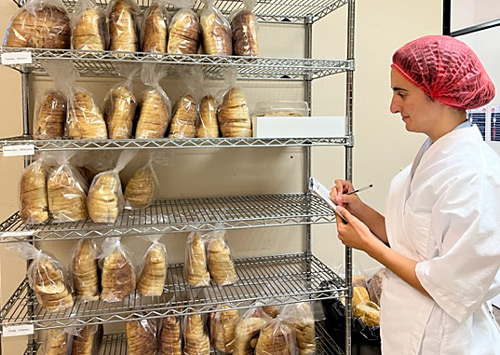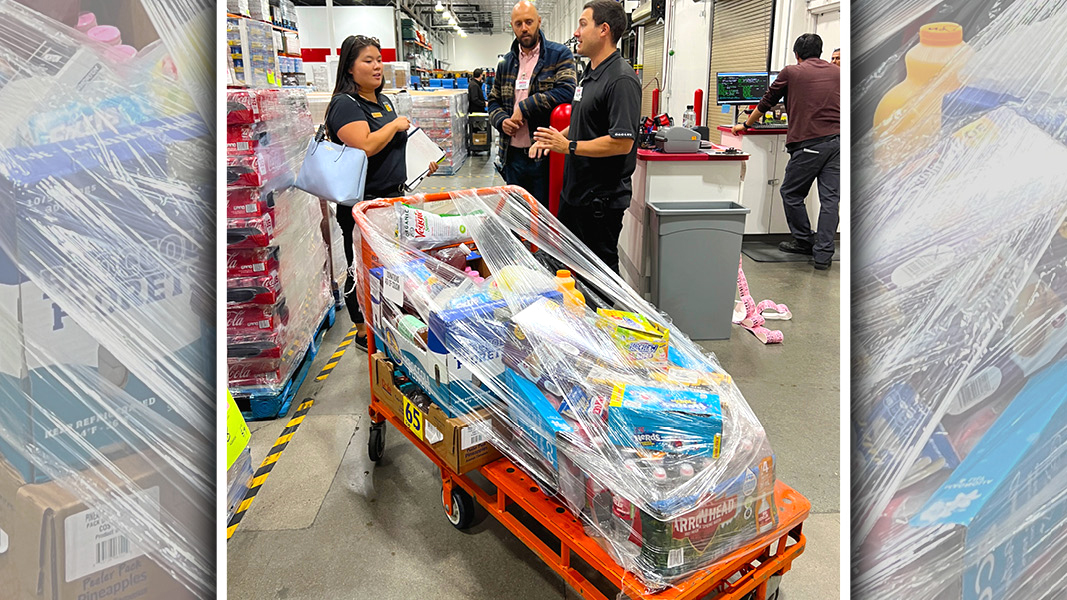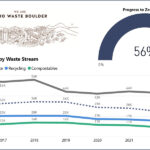Top: Donations ready to be picked up by a food recovery organization. Photos courtesy Solana Center
Solana Center for Environmental Innovation, based in Encinitas, California, offers a three-day online course to provide inspector training on edible food recovery for businesses to comply with SB (Senate Bill) 1383, the Short-Lived Climate Pollutant regulation that went into effect in California on January 1, 2022. The course was first offered in November 2024; the next 3-day training will run on March 5, 12, and 13, 2025. The SB 1383 law, enacted to reduce greenhouse gas emissions caused by landfilled organic waste, includes a requirement that by 2025, the state must increase edible food recovery by 20% vis-a-vis a 2018 baseline calculated by CalRecycle, the state agency responsible for enforcement of the law. Businesses that meet certain thresholds are required to recover their surplus edible food for donation to food rescue organizations. All businesses needed to be donating all their edible excess food by January 1, 2024. Jurisdictions are responsible for enforcing the law.
“Many cities and jurisdictions are still in the planning and beginning phases of implementation,” explains Robin Fator, Solana Center’s Marketing and Development Manager. “Our course provides guidance and clarity to increase compliance. Inspections may be conducted by jurisdictions or their subcontractor designees. Subcontractors can be consultants, environmental health departments, and food recovery organizations. SB 1383 began requiring inspections in January 2024. However, jurisdictions have discretion on how to approach inspections and enforcement. Not all regulated businesses must receive onsite inspections. Jurisdictions must provide CalRecycle justification for their approach.”

Procedures for inspecting food businesses and food recovery organizations are covered in the course.
Solana Center has run close to 1,000 inspections on behalf of 15 different cities since the law went into effect. From this vast experience, the Center created inspection protocols and data collection templates. The information required from a business inspection includes the amount of donated food recorded by the business as well as observations to gauge the comprehensiveness of their donation program. The course, “Food Recovery Inspection Training for California SB 1383 Compliance,” is the first of its kind, making Solana Center’s tested methods and templates available to course participants. Attendees can receive professional development credits for the course. “The program grew from the many requests received from jurisdictions seeking help to inspect food businesses,” notes Mallika Sen, Solana Center’s Environmental Solutions Director. “The primary audience has been SB 1383 implementers — cities, consultants, and corporate offices of food business chains. The training consists of three half days with each day building on the previous days.”
The first session, Fundamentals of SB 1383 Food Recovery, explains the regulations and identifies those impacted. Best practices for successful food recovery programming are discussed. The second day, Inspection Training for Food Recovery, dives into the procedures for inspecting food businesses and food recovery organizations. All aspects of observation recording and data collection are covered. The class reviews examples of various compliance issues, identifying incidents such as less than maximum food donation and intentional food spoilage. The final day examines nuances in each business sector (e.g., differences between inspections in restaurants and grocery stores). Case studies are discussed and students participate in role-playing exercises. In addition to lecture content, the course contains field videos with interviews, interactive exercises, and mock inspections.
As the SB 1383 regulating body, CalRecycle reviewed the course content, attended the full November course, and is promoting it statewide. “Based on the course evaluation, students particularly appreciated the opportunities to practice the material through mock inspections and interactive exercises,” notes Jessica Toth, Solana Center’s Executive Director. “A local government administrator tasked with completing inspections in his city shadowed a Solana Center inspection to gain field experience following the course.”













